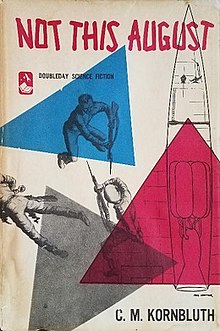Not This August
This article needs additional citations for verification. (October 2007) |
 Dust-jacket from the first edition | |
| Author | C.M. Kornbluth |
|---|---|
| Cover artist | Mel Hunter |
| Language | English |
| Genre | Science fiction novel |
| Publisher | Doubleday |
Publication date | 1955 |
| Publication place | United States |
| Media type | Print (hardback) |
| Pages | 190 pp |
Not This August, also known as Christmas Eve, is a science fiction novel by C.M. Kornbluth. It was originally published in 1955 by Doubleday. It was serialized in Maclean's Magazine (Canada) in May and June 1955. A revised edition with a new foreword and afterword by Frederik Pohl was published in 1981 by Tor Books, ISBN 0-523-48518-2.[1] The title comes from author Ernest Hemingway's "Notes on the Next War".
Plot summary
By 1965, the United States and Canada have been at war with the Soviet Union and the Chinese People's Republic for three years. Both sides' atomic weapons are ineffective as anti-aircraft missiles shoot down any bombers or guided missiles, so ground forces have done most of the fighting. The Communist nations—whose armies greatly outnumber the North Americans—conquered Western Europe, invaded South America, and are moving to Texas. All American males are required to either perform agricultural work to feed the armed forces or be drafted into military, construction, or factory service. Food, electricity, and gasoline are rationed, only two CONELRAD stations broadcast on radio, and New York City is reportedly under martial law.
Billy Justin, a 37-year-old commercial artist and Korean War veteran, is working as a dairy farmer in Chiunga Center, New York when the radio announces that Soviet and Chinese forces have overrun the Canadian-American line at El Paso, Texas. The last American naval forces were destroyed three months earlier but the news had been kept secret. The Communist armies destroy in Los Alamos, New Mexico the incomplete Yankee Doodle, a satellite capable of dropping hydrogen bombs from orbit that are impossible to shoot down.
The President surrenders to the Communists, who over the next several months divide the United States at the Mississippi River, and together form the North American People's Democratic Republic. Other than a military garrison, a formal disarmament, searches for fissionable material, and the establishment of production quotas for food, the surrender of the United States leaves Chiunga Center largely untouched. The Soviets kill the Communist fifth column members who had secretly aided the invasion to prevent them from organizing against the new government, but are otherwise relatively peaceful and amenable to the black market.
A paraplegic comes to Justin's farm asking for work; he is General Hollerith, a veteran of the previous war. He and Justin join a conspiracy to finish the real satellite, a manned space station buried in Chiunga County that the United States had been building for 15 years. It requires parts and engineering knowledge to launch. MVD troops arrive, shoot the corrupt Soviet soldiers, and are much more cruel. They capture, to Justin's knowledge, all of the conspirators but himself and the general.
Justin deduces that the contacts he needs to make are in Washington, Pennsylvania. With a traveling preacher, Sparhawk, Justin walks the hundreds of miles from Chiunga Center to Washington, benefiting from the Democratic Republic's policy of respecting the Americans' freedom of religion. At Washington Justin receives instructions from the nationwide resistance movement for an attack planned for Christmas Eve on Chiunga Center to liberate the satellite.
Despite the Soviets' arrest and torture of a local farmer, they are ignorant of what "Christmas Eve", a mild oath they have heard sworn by various citizens, means until the battle begins. Coordinated by Hollerith, bridges around the area are blown up and nearby arsenals are sabotaged. The townspeople, many of whom are veterans, battle the Soviets as the space station launches.
Hollerith's forces triumph, and the Americans transmit an ultimatum to the Soviets and Chinese: The satellite is armed and will destroy Moscow and Peiping in 24 hours if occupation soldiers do not leave American soil and free all prisoners of war. Hollerith offers Justin important positions in the new government and society, but he refuses them and kneels in prayer with Sparhawk, fearing the fulfillment of mutual assured destruction.
Reception
Galaxy reviewer Floyd C. Gale praised the novel as "believable throughout and thoroughly frightening."[2] The Boston Herald gave a positive review and the Chicago Tribune called it "The most shockingly realistic science fiction book since Orwell's '1984'...."
Notes
- ^ "The Internet Speculative Fiction Database". Retrieved January 2, 2008.
{{cite web}}: Cite has empty unknown parameter:|coauthors=(help) - ^ "Galaxy's 5 Star Shelf", Galaxy Science Fiction, January 1955, p.92
References
- Tuck, Donald H. (1974). The Encyclopedia of Science Fiction and Fantasy. Chicago: Advent. p. 260. ISBN 0-911682-20-1.
